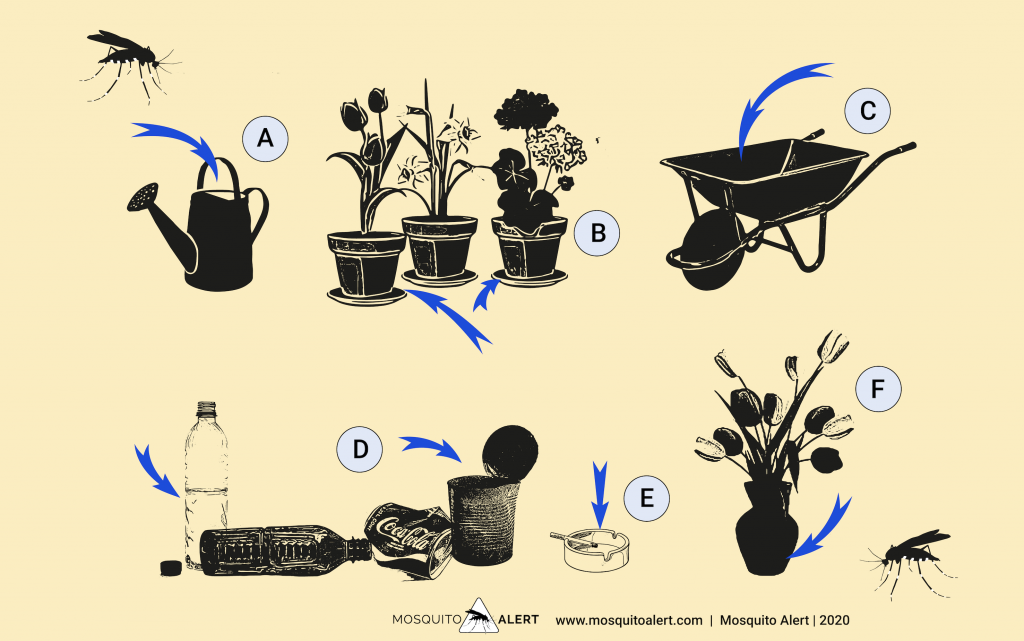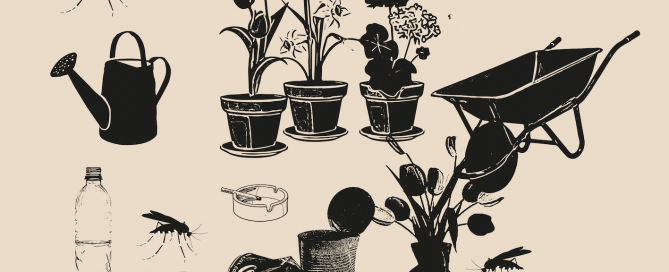The tiger mosquito has already returned in some areas, in others, its imminent arrival, that is why we propose you to carry out some small actions to reduce its number in our homes. Let’s take advantage of the lockdown to take greater care of those spaces in which the mosquito could reproduce.
In May is when the tiger mosquito observations begin to shoot (Fig. 1), this year we have already received some photos of the mosquito in the last weeks of April. The arrival of warm temperatures has reactivated the mosquito after winter, the heat of this season accelerates the growth and development of its larvae. At high temperatures they can complete development in less than a week. That is a new generation of mosquitoes hovering around our homes. If we want to prevent their presence at home we must be attentive to those places where they can reproduce.
In addition to the inconvenience caused by the tiger mosquito during the summer months, it is necessary to remember its sanitary importance for being a transmitter of diseases such as dengue, Zika or chikungunya, but not the SARS-CoV-2 of COVID- 19.
Avoid the tiger mosquito early in the season
The beginning of the tiger mosquito season is a good time to clean our outdoor spaces, which includes patios, terraces, balconies, gardens and our small orchard. This is the time to curb the number of mosquitoes in the neighborhood. If we take care of our spaces now, and we manage to eliminate the first generation of the season, we will eliminate those that could come later in the summer.
It is important to take advantage of the start of the season to check all those places that can accumulate water
Remove it from patios, terraces and balconies
On patios, terraces and balconies, pay attention to the flower pots. Especially the plate that collects the excess water when we water them. That little standing water is enough for the tiger mosquito to reproduce. Check every two or three days for standing water and remove it. Sand can be added to the plate to absorb excess water.
Do not leave water for days in the mop bucket, or in ashtrays that can be filled with rainwater. Empty them frequently.
Also monitor drinkers and eaters of birds and pets, such as cats and dogs. If they are not emptied frequently they can be a breeding ground for mosquitoes. Avoiding it is as easy as emptying and changing the water every two to three days. Pets will also appreciate having fresh water!
The channels and drains of terraces and balconies that collect rainwater can also accumulate it and end up being a breeding place for the mosquito. It is important to keep them clean so that the water does not stagnate inside.
Here we offer more tips (in Spanish) to avoid the tiger mosquito on terraces and balconies.

Fig. 2. Objects that can accumulate water in our outdoor spaces where the tiger mosquito can reproduce. (A) Sprinkler. (B) Plates from the pots. (C) Wheelbarrow. (D) Bottles and other disused cans. (F) Vases. Source: Mosquito Alert (CC-BY-NC-2.0)
Remove it from the garden and orchard
n the garden, look at the gardening material, such as watering cans, wheelbarrows, drums, buckets, etc … try to turn them upside down when possible, empty them periodically or cover them with a fine mesh so that the mosquitoes can access the water. Here you will find specific and detailed recommendations to avoid them in the garden (in Spanish).
If we have a garden, we must ensure that the working tools do not accumulate water. As in the case of gardens, try to turn around those objects that can hold water (buckets, wheelbarrows, etc.). In these spaces many times there are also small rainwater collection tanks to irrigate the garden. The tank can be covered with a mosquito net that will prevent the mosquito from accessing the water to deposit the eggs. Also be on the lookout for plastic drums and tarps that can generate bags and accumulate rainwater. Any small body of water the tiger mosquito will take advantage of. For more information on how to eliminate the tiger mosquito in your garden visit this page.
By taking care of our spaces we can reduce their presence, both in the city and in the countryside. Everyone’s actions are necessary for its control.
Share this information with neighbors and acquaintances so that your actions have a greater impact. The more we are who try to avoid it, the better!
Don’t forget to send us photos of the mosquito when you find it. Your observations are relevant to his study!




